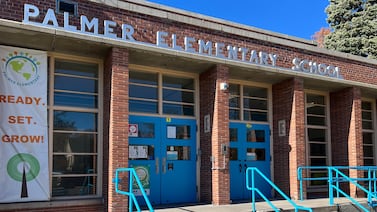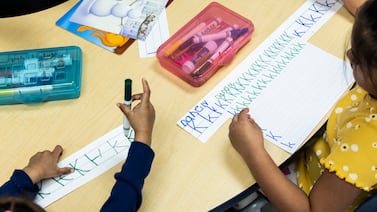Updated: Chicago Public Schools has extended the deadline for applications for candidacy until Wednesday, March 9, at 3 p.m.
With a Friday deadline to declare candidacy quickly approaching and hundreds of new seats for students available, Chicago Public Schools faces a shortage of about 5,500 parents, students, and community members for seats on a Local School Council.
Across the district, 722 candidate applications had been submitted for 6,239 total positions on councils across 509 schools as of Friday, and 307 schools had zero candidates for open positions, though it’s not clear how many applications have been held at campuses and not yet centrally logged.
The district said it has participated in 80 events to stoke participation ahead of the deadline and that historically it receives a crush of applications in the final week before the deadline for candidacy. LSC elections will be held on April 20 for elementary schools and April 21 for high schools.
Elected every two years and a facet of Chicago school governance since the mid-1990s, the councils comprise parents, community members, school staff, and student representatives. (Students must be in sixth grade to run and serve one-year terms; to see who has signed up to run at your area school so far, click here.) They operate at the vast majority of district schools. Chicago’s school councils are one of the most hyperlocal examples of school governance in the country.
The councils’ authority includes voting on the annual school budget, approving the school academic plan, and selecting and evaluating principals. In 2020, as a wave of student activism helped put school policing strategies in the spotlight nationally, Mayor Lori Lightfoot tasked Chicago’s high school councils with voting on whether to keep or remove police officers, a controversial transfer of authority that put some members — who do not receive pay — in a position of public scrutiny.
The district has struggled with tepid participation in the recent decade. During the last election cycle in 2020, as the city was in the grips of the pandemic, more than 35,000 votes were cast for council candidates, a decrease of 43% from the 2018 election. After the last election, about 900 seats remained unfilled — a situation that prompted a wave of appointments.
Organizer Natasha Erskine, who holds training workshops independent of the district through the parent advocacy group Raise Your Hand, said she has been trying to encourage more parents, community members, and students to participate by stressing the opportunity of this pandemic moment.
“To be quite frank, I really feel like there is no greater time to be on a council,” Erskine said. “The pandemic created an all-hands-on-deck situation and to see how schools with strong and effective LSCs navigated it, is really a reflection of where our schools can be.”
Still, she’s worried that she hasn’t seen much interest in some areas of the city where her group has been trying to spread the word and boost representation, like the Greater South Side.
“I hear, in conversations [with potential candidates], the exhaustion of it all — people really feeling burnt out, for lack of a better word,” she added, worrying that feeling will impact interest, particularly in parts of the city hit hardest by COVID cases and deaths.
She said she’s hopeful that some changes to this year’s election process will bring in some new energy. This year’s elections are the first to allow student representation at the elementary and middle school level. The number of seats for high school students has also expanded to three per school. High school student members have more voting authority than middle school participants.
“It’s such a great opportunity to celebrate youth voice,” she said.
Rem Johannknecht, a senior at Walter Payton College Preparatory High School, is finishing up a one-year term on the school’s council. During a time of “internal leadership challenges” at his campus, his council weighed in on the budget and the school improvement plan and launched a principal search.
“A lot of times the adults at the table don’t really know what’s going on, and what students have to say is really valuable,” he said. As a student representative, for example, he helped troubleshoot an academic problem: a trend of students giving up on advanced math courses. After surveying students, they learned that students felt less mastery of building block concepts coming into the start of the school year after extended remote learning and some were discouraged by grading and homework policies.
From that, the student LSC members worked with students and teachers to align grading policies more closely to the Advanced Placement exam’s rubric and revamped online homework requirements.
“We were able to make some really meaningful changes,” Johannknecht said.
District spokeswoman Mary Fergus said in a statement that the district recognized that community, parent, and student engagement through the councils is a “necessary and powerful predictor” of a positive teaching and learning environment. The councils have also served as a stepping stone for future politicos; several current members of City Council and the Illinois General Assembly tout school council service as their first elected role.
Cassie Walker Burke is the Chalkbeat Chicago bureau chief. She covers early learning and K-12. Contact Cassie at cburke@chalkbeat.org.




